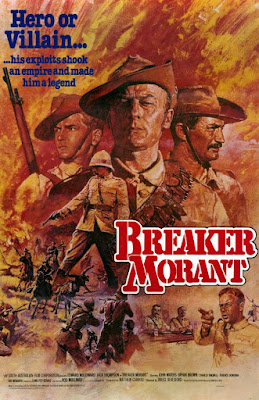With this fiercely admired war drama, Bruce Beresford came on-board as the most conventional of the handful of directors who belatedly led Australian cinema onto the international scene in the late ‘70s/early ‘80s. (Others included Peter Weir, Fred Schepisi & George Miller.) The fact-based Boer War story covers the court-martial proceedings against three Aussie lieutenants charged with executing prisoners in the field. While the larger purpose is to use the trial, and its preordained outcome, as a sop to the German Kaiser so he’ll keep his forces out of a war that’s winding up. In other words, it’s a set-up, with ‘honest’ soldiers taking the fall for following pointedly ambiguous instructions from their superiors. The problem is that the film, good as it often is, is also a set-up, siding against the establishment by making them all ghastly hypocrites. Overkill, since we’re already on the soldiers’ side. And also because there’s actually much to be said on both sides on the issues, a moral complexity for a G. B. Shaw or a Tom Stoppard to work thru. Instead, Beresford irons out intellectual wrinkles and cues our response. (At one point, he actually has the lead prosecutor twirl his mustache.) Very near the thudding rhetorical importance of a Stanley Kramer movie summation. Fortunately, Beresford is a far livelier, more technically assured helmer than Kramer. So, with help from Donald McAlpine’s handsome lensing, and a host of near-legendary perfs out of Edward Woodward, Jack Thompson, Bryan Brown, et al., the film is pretty devastating while you are watching. The questions come later.
DOUBLE-BILL: Chances are, Beresford is a fan of Stanley Kubrick’s imposing WWI drama PATHS OF GLORY/’57.



No comments:
Post a Comment